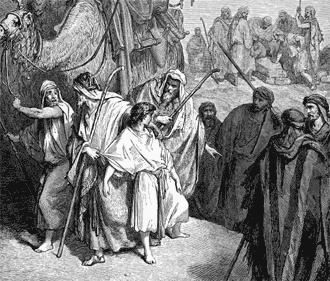Saturday, July 22, 2006
A Brother is Born for Adversity (Genesis 37-39)

Is there a situation in all of scripture where God prefers the older brother to the younger one? I can’t think of any off hand. Anyway, this conflict is defiantly one of the strongest themes in Genesis. Cain vs. Abel, Ishmael vs. Isaac, Esau vs. Jacob, and now everyone except Benjamin vs. Joseph!
It’s the same story as before: the father loves Joseph more than the others, and the older ones hate him for it. Yet God seems to aggravate things by sending Joseph dreams of all his family bowing down to him. Joseph’s eagerness to share his dreams with his family doesn’t help either.
The brothers’ spite is just classic – so rich in hatred that the words sting even after being translated thousands of years later.
Here comes this dreamer. Come now, let us kill him and throw him into one of the pits. Then we will say that a fierce animal has devoured him, and we will see what will become of his dreams.In the end, they decide to make a profit instead. There’s one little detail that I missed before: Judah sells Joseph for twenty pieces of silver. That sounds rather familiar.
While Joseph is off learning all the joys of slavery, we are treated to a bizarre escapade with Judah and his daughter-in-law Tamar. Tamar’s husband dies, and Judah’s son Onan is expected to do his brotherly duty and impregnate her so she can have a son. However, during sex he makes sure nothing goes in, and God kills him for this selfishness. Judah then sees Tamar as bad luck, so he doesn’t let her sleep with his remaining son. Tamar then poses as a prostitute, sleeps with Judah himself, and keeps a few of his personal items. When it is found that Tamar is pregnant, the hypocritical Judah orders her burned alive. Tamer then produces the items as proof that Judah himself is the father, and she is vindicated.
Meanwhile things are going well for Joseph in Egypt. He serves his master Potiphar so well that he’s given control over his entire estate. But Potiphar’s wife keeps pursuing him, demanding that he sleep with her. He refuses. As David Plotz noticed, Joseph is the first person in scripture to resist sexual temptation. Potiphar’s wife uses some of Joseph’s personal items to frame him of rape, and he’s wrongfully condemned to prison.
Comments:
<< Home
You can add to the list of younger-favored-over-older Leah vs. Rachel. There's a part of me that doesn't like that... the older sister part of me. But it hearkens back (or forward) to Paul saying
"For consider your calling, brothers: not many of you were wise according to worldly standards, not many were powerful, not many were of noble birth. But God chose what is foolish in the world to shame the wise; God chose what is weak in the world to shame the strong; God chose what is low and despised in the world, even things that are not, to bring to nothing things that are, so that no human being might boast in the presence of God."
From the get-go, God presents himself as the God of the underdog.
"For consider your calling, brothers: not many of you were wise according to worldly standards, not many were powerful, not many were of noble birth. But God chose what is foolish in the world to shame the wise; God chose what is weak in the world to shame the strong; God chose what is low and despised in the world, even things that are not, to bring to nothing things that are, so that no human being might boast in the presence of God."
From the get-go, God presents himself as the God of the underdog.
Incidentally, is the God-of-the-underdog thing unique? I know the gods of the Greeks and Romans don't tend to favor the weak. It seems that a weak-favoring God is far from obvious, though we are pretty accustomed to it at this point in world history. I wonder if forms of government focused on equality and protecting the weak can develop outside a Judeo-Christian framework. Is it fair to say that the differences between Judaism/Christianity and Islam have their roots in the difference between having a God-of-the-older and a God-of-the-younger?
Yeah, I didn't mention the Leah and Rachel thing because Leah actually becomes the underdog herself pretty quick, and then God blesses her with lots of kids. But you're right.
Your second post is really good.
Post a Comment
Your second post is really good.
<< Home
Home
Who is Oyarsa?
Contact Me
Blog the Bible
Recent Comments
Archives
- June 2006
- July 2006
- August 2006
- September 2006
- October 2006
- November 2006
- December 2006
- January 2007
- February 2007
- March 2007
- April 2007
- May 2007
- June 2007
- July 2007
- August 2007
- September 2007
- October 2007
- November 2007
- December 2007
- January 2008
- February 2008
- March 2008
- April 2008
- May 2008
- June 2008
- July 2008
- September 2008
- October 2008
- November 2008
- July 2009
- August 2009
- January 2010
- August 2010
Recommended Books
